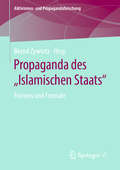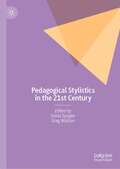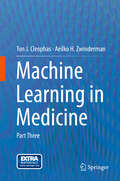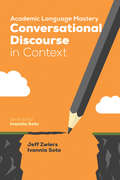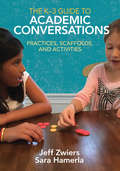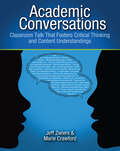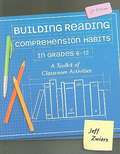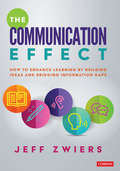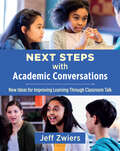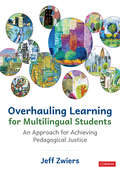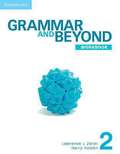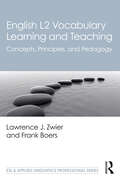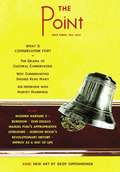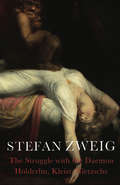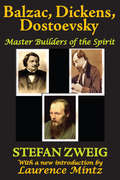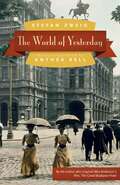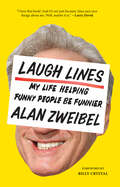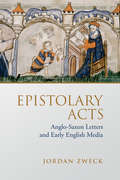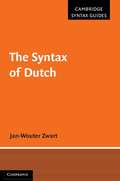- Table View
- List View
Propaganda des „Islamischen Staats“: Formen und Formate (Aktivismus- und Propagandaforschung)
by Bernd ZywietzDie Propaganda der terroristischen Miliz „Islamischer Staat“ hat für Aufsehen gesorgt und die Debatte um das Internet und vor allem das „Social Web“ als Risikotechnologie oder Gefahrenraum mitbestimmt. Dabei setzt der IS auf ein breites Spektrum medialer und gestalterischer Formen und Formate einer globalen, digitalen Medienkultur, um ein internationales Publikum zu erreichen: Online-Videos, anashid (Lieder) und Computerspiele; Internet-Meme, Social Media Posting oder Selfies. Der Sammelband gibt Einblick in die Bandbreite dieser jihadistischen Kommunikate, ihrer Ausdrucks- und Darstellungsweisen und zeigt dabei Möglichkeiten der Einordnung und der Auseinandersetzung auf.
Pedagogical Stylistics in the 21st Century
by Sonia Zyngier Greg WatsonThis edited book provides cutting edge contributions from an international array of prominent experts who discuss the relevance of pedagogical stylistics in relation to diverse contexts and areas, including empirical approaches, corpus stylistics, creative writing, literary-linguistic criticism, students as researchers, critical discourse, academic register, text-world pedagogy, cognitive stylistics, classroom discourse, language of literary texts, L1/L2 education, EFL learners, and multimodal stylistics. Intended as a follow-up to Watson and Zyngier (2007), this volume situates the reader by offering a broad assessment of how the field has developed during the past 15 years and where it stands now. By examining both contemporary research and future challenges, it should be regarded as essential reading for all teachers, researchers, scholars, and students interested in understanding language and how to apply stylistics in educational settings. This book will be of interest to students and scholars working in stylistics, cognitive linguistics, language teaching, applied linguistics, literary studies, and materials development.
Machine Learning in Medicine
by Aeilko H. Zwinderman Ton J. CleophasMachine learning is a novel discipline concerned with the analysis of large and multiple variables data. It involves computationally intensive methods, like factor analysis, cluster analysis, and discriminant analysis. It is currently mainly the domain of computer scientists, and is already commonly used in social sciences, marketing research, operational research and applied sciences. It is virtually unused in clinical research. This is probably due to the traditional belief of clinicians in clinical trials where multiple variables are equally balanced by the randomization process and are not further taken into account. In contrast, modern computer data files often involve hundreds of variables like genes and other laboratory values, and computationally intensive methods are required. This book was written as a hand-hold presentation accessible to clinicians, and as a must-read publication for those new to the methods.
Academic Language Mastery: Conversational Discourse in Context
by Jeff Zwiers Ivannia M. SotoBy now it’s a given: if we’re to help our ELLs and SELs access the rigorous demands of today’s content standards, we must cultivate the “code” that drives school success: academic language. Look no further for assistance than this much-anticipated series from Ivannia Soto, in which she invites field authorities Jeff Zwiers, David and Yvonne Freeman, Margarita Calderon, and Noma LeMoine to share every teacher’s need-to-know strategies on the four essential components of academic language. The subject of this volume is conversational discourse. Here, Jeff Zwiers reveals the power of academic conversation in helping students develop language, clarify concepts, comprehend complex texts, and fortify thinking and relational skills. With this book as your roadmap, you’ll learn how to: Foster the skills and language students must develop for productive interactions Implement strategies for scaffolding paired conversations Assess student’s oral language development as you go It’s imperative that our ELLs and SELs practice academic language in rich conversations with others in school, especially when our classrooms may be their only opportunities to receive modeling, scaffolding, and feedback focused on effective discourse. This book, in concert with the other three volumes in the series, can provide both a foundation and a framework for accelerating the learning of diverse students across grade levels and disciplines.
Academic Language Mastery: Conversational Discourse in Context
by Jeff Zwiers Ivannia M. SotoBy now it’s a given: if we’re to help our ELLs and SELs access the rigorous demands of today’s content standards, we must cultivate the “code” that drives school success: academic language. Look no further for assistance than this much-anticipated series from Ivannia Soto, in which she invites field authorities Jeff Zwiers, David and Yvonne Freeman, Margarita Calderon, and Noma LeMoine to share every teacher’s need-to-know strategies on the four essential components of academic language. The subject of this volume is conversational discourse. Here, Jeff Zwiers reveals the power of academic conversation in helping students develop language, clarify concepts, comprehend complex texts, and fortify thinking and relational skills. With this book as your roadmap, you’ll learn how to: Foster the skills and language students must develop for productive interactions Implement strategies for scaffolding paired conversations Assess student’s oral language development as you go It’s imperative that our ELLs and SELs practice academic language in rich conversations with others in school, especially when our classrooms may be their only opportunities to receive modeling, scaffolding, and feedback focused on effective discourse. This book, in concert with the other three volumes in the series, can provide both a foundation and a framework for accelerating the learning of diverse students across grade levels and disciplines.
The K-3 Guide to Academic Conversations: Practices, Scaffolds, and Activities
by Jeff Zwiers Sara R. Hamerla“For thousands of years people have been using the skills we describe in this book to engage in conversations with others. What isn’t as prevalent, however, is instruction--especially in primary grades—in which we engage students in productive conversations about academic ideas. This book fills that very big need.” --Jeff Zwiers & Sara Hamerla Talk about content mastery . . . Primary teachers, you won’t want to miss this: if you’re looking for a single resource to foster purposeful content discussions and high-quality interpersonal engagement, then put Jeff Zwiers and Sara Hamerla’s K-3 Guide to Academic Conversations at the top of your reading list. Whether your students love to talk or not, all must be equipped with key conversation skills such as active listening, taking turns, posing, clarifying, supporting with examples, and arguing ideas. This ready resource comes packed with every imaginable tool you could need to make academic conversations part of your everyday teaching: Sample lesson plans and anchor charts Guidelines for creating effective prompts Applications across content areas, with corresponding assessments Rubrics and protocols for listening to student speech Transcripts of conversations and questions for reflection Companion website with video and downloadable resources Tens of thousands of students in the upper grades have reaped the benefits of academic conversations: high-quality face-to-face interactions, increased motivation, stronger collaborative argumentation skills, and better understanding and retention of content. The K-3 Guide to Academic Conversations is that resource for providing your primary students with the same powerful learning opportunities.
The K-3 Guide to Academic Conversations: Practices, Scaffolds, and Activities
by Jeff Zwiers Sara R. Hamerla“For thousands of years people have been using the skills we describe in this book to engage in conversations with others. What isn’t as prevalent, however, is instruction--especially in primary grades—in which we engage students in productive conversations about academic ideas. This book fills that very big need.” --Jeff Zwiers & Sara Hamerla Talk about content mastery . . . Primary teachers, you won’t want to miss this: if you’re looking for a single resource to foster purposeful content discussions and high-quality interpersonal engagement, then put Jeff Zwiers and Sara Hamerla’s K-3 Guide to Academic Conversations at the top of your reading list. Whether your students love to talk or not, all must be equipped with key conversation skills such as active listening, taking turns, posing, clarifying, supporting with examples, and arguing ideas. This ready resource comes packed with every imaginable tool you could need to make academic conversations part of your everyday teaching: Sample lesson plans and anchor charts Guidelines for creating effective prompts Applications across content areas, with corresponding assessments Rubrics and protocols for listening to student speech Transcripts of conversations and questions for reflection Companion website with video and downloadable resources Tens of thousands of students in the upper grades have reaped the benefits of academic conversations: high-quality face-to-face interactions, increased motivation, stronger collaborative argumentation skills, and better understanding and retention of content. The K-3 Guide to Academic Conversations is that resource for providing your primary students with the same powerful learning opportunities.
Academic Conversations: Classroom Talk that Fosters Critical Thinking and Content Understandings
by Jeff Zwiers Marie CrawfordConversing with others has given insights to different perspectives, helped build ideas, and solve problems. Academic conversations push students to think and learn in lasting ways. Academic conversations are back-and-forth dialogues in which students focus on a topic and explore it by building, challenging, and negotiating relevant ideas. In Academic Conversations: Classroom Talk that Fosters Critical Thinking and Content Understandings authors Jeff Zwiers and Marie Crawford address the challenges teachers face when trying to bring thoughtful, respectful, and focused conversations into the classroom. They identify five core communications skills needed to help students hold productive academic conversation across content areas: Elaborating and Clarifying Supporting Ideas with Evidence Building On and/or Challenging Ideas Paraphrasing Synthesizing This book shows teachers how to weave the cultivation of academic conversation skills and conversations into current teaching approaches. More specifically, it describes how to use conversations to build the following: Academic vocabulary and grammar Critical thinking skills such as persuasion, interpretation, consideration of multiple perspectives, evaluation, and application Literacy skills such as questioning, predicting, connecting to prior knowledge, and summarizing An academic classroom environment brimming with respect for others' ideas, equity of voice, engagement, and mutual support The ideas in this book stem from many hours of classroom practice, research, and video analysis across grade levels and content areas. Readers will find numerous practical activities for working on each conversation skill, crafting conversation-worthy tasks, and using conversations to teach and assess. Academic Conversations offers an in-depth approach to helping students develop into the future parents, teachers, and leaders who will collaborate to build a better world.
Building Reading Comprehension Habits in Grades 6-12: A Toolkit of Classroom Activities (Second Edition)
by Jeff ZwiersThis second edition succinctly describes practical ideas, including more than 15 new activities, which have been working in a wide range of middle school and high school classrooms. The author has used the ideas, seen them used by others, and researched their effectiveness in a variety of settings.
The Communication Effect: How to Enhance Learning by Building Ideas and Bridging Information Gaps
by Jeff ZwiersThe &“communication effect&” is what happens when we saturate our classrooms with authentic communication, which occurs when students use language to build up ideas and do meaningful things. For starters, authentic communication deepens and increases language development, learning of content concepts and skills, rigor and engagement, empathy and understanding of others&’ perspectives, agency and ownership of core ideas across disciplines, and social and emotional skills for building strong relationships. And these are just the starters. With The Communication Effect, Dr. Jeff Zwiers challenges teachers in Grades 3 and up to focus less on breadth and more on depth by grounding instruction and assessment in authentic (rather than pseudo-) communication. This book provides: Ideas for cultivating classroom cultures in which authentic communication thrives Clear descriptions and examples of the three features of authentic communication: 1. building up key ideas (claims and concepts); 2. clarifying terms and supporting ideas; and 3. creating and filling information gaps Over 175 suggestions for using the three features of authentic communication to enhance twenty commonly used instructional activities across disciplines Additional examples of not-so-commonly-used activities that embody the three features Suggestions for improving four different types of teacher creativity needed to design effective lessons, activities, and assessments that maximize authentic communication Our students deserve to get the most out of each minute of each lesson. Authentic communication can help. As you read The Communication Effect and apply its ideas, you will see how much better equipped and inspired your students are to grow into the amazing and gifted people that they were meant to become.
The Communication Effect: How to Enhance Learning by Building Ideas and Bridging Information Gaps
by Jeff ZwiersThe &“communication effect&” is what happens when we saturate our classrooms with authentic communication, which occurs when students use language to build up ideas and do meaningful things. For starters, authentic communication deepens and increases language development, learning of content concepts and skills, rigor and engagement, empathy and understanding of others&’ perspectives, agency and ownership of core ideas across disciplines, and social and emotional skills for building strong relationships. And these are just the starters. With The Communication Effect, Dr. Jeff Zwiers challenges teachers in Grades 3 and up to focus less on breadth and more on depth by grounding instruction and assessment in authentic (rather than pseudo-) communication. This book provides: Ideas for cultivating classroom cultures in which authentic communication thrives Clear descriptions and examples of the three features of authentic communication: 1. building up key ideas (claims and concepts); 2. clarifying terms and supporting ideas; and 3. creating and filling information gaps Over 175 suggestions for using the three features of authentic communication to enhance twenty commonly used instructional activities across disciplines Additional examples of not-so-commonly-used activities that embody the three features Suggestions for improving four different types of teacher creativity needed to design effective lessons, activities, and assessments that maximize authentic communication Our students deserve to get the most out of each minute of each lesson. Authentic communication can help. As you read The Communication Effect and apply its ideas, you will see how much better equipped and inspired your students are to grow into the amazing and gifted people that they were meant to become.
Next Steps with Academic Conversations: New Ideas for Improving Learning Through Classroom Talk
by Jeff ZwiersDr. Jeff Zwiers, an educational researcher at Stanford University, has spent the last 15 years analyzing classroom conversations to see how they can be better used and improved in classroom settings. Teachers who have worked with him report significant growth in students&’ engagement, content learning, language, creativity, and sense of agency. Zweirs introduced his initial vision for classroom conversations Academic Conversations: Classroom Talk that Fosters Critical Thinking and Content Understanding. His follow-up book, Next Steps with Academic Conversations: New Ideas for Improving Learning Through Classroom Talk , expands the first book with updated classroom strategies and practices. In this new version, teachers will discover: How to introduce buildable ideas and teach students how to develop and support them Equitable classroom discussions and how diverse backgrounds conversing can benefit social skills and emotional intelligence Highlights of new research-based theories on classroom conversation Ways to develop students' confidence in conversation and how classroom skills can apply to real world interactions This resource is the product of his extensive research, co-teaching, and collaborating with a wide range of educators. It was written for busy teachers who want a practical guide for strengthening the quality and quantity of productive conversations in their lessons.
Overhauling Learning for Multilingual Students: An Approach for Achieving Pedagogical Justice
by Jeff ZwiersAdopt a strengths-based, justice-centered approach to teaching multilinguals Offering educators a path to pedagogical justice for multilingual learners, Overhauling Learning for Multilingual Students outlines a comprehensive alternative model for instruction and assessment. With an emphasis on engaging multilingual learners in authentic communication and promoting student agency and creativity, this book is an urgent call-to-action for educators at all levels to value and leverage the many assets that multilingual students bring to every classroom. The book outlines six dimensions of pedagogical justice and offers practical strategies to implement a learner-centered approach that will help all students thrive. Additional features include: An assets-based framework designed to help multilingual learners learn and grow Guidance for shifting instructional strategies away from remediation and test preparation toward an engaging, justice-centered approach Activities to to help students collaboratively build up unique and important ideas (claims and concepts) across disciplines Written by scholar, practitioner, and best-selling author, Jeff Zwiers, Overhauling Learning for Multilingual Students supports educators to de-think and rethink traditional one-size-fits-all approaches to teaching and assessing multilingual learners.
Overhauling Learning for Multilingual Students: An Approach for Achieving Pedagogical Justice
by Jeff ZwiersAdopt a strengths-based, justice-centered approach to teaching multilinguals Offering educators a path to pedagogical justice for multilingual learners, Overhauling Learning for Multilingual Students outlines a comprehensive alternative model for instruction and assessment. With an emphasis on engaging multilingual learners in authentic communication and promoting student agency and creativity, this book is an urgent call-to-action for educators at all levels to value and leverage the many assets that multilingual students bring to every classroom. The book outlines six dimensions of pedagogical justice and offers practical strategies to implement a learner-centered approach that will help all students thrive. Additional features include: An assets-based framework designed to help multilingual learners learn and grow Guidance for shifting instructional strategies away from remediation and test preparation toward an engaging, justice-centered approach Activities to to help students collaboratively build up unique and important ideas (claims and concepts) across disciplines Written by scholar, practitioner, and best-selling author, Jeff Zwiers, Overhauling Learning for Multilingual Students supports educators to de-think and rethink traditional one-size-fits-all approaches to teaching and assessing multilingual learners.
Grammar and Beyond: Level 2 Workbook
by Lawrence J. Zwier Harry HoldenStudents learn real-world language. Grammar and Beyond is based on extensive corpus research into the ways that grammar is used in the real world. The series takes this research base and focuses students' attention on the most relevant and accurate information. Students then immediately apply what they have learned in speaking and writing. While the series places special emphasis on grammar for writing, all four skills are covered thoroughly. As students prepare to write, they practice editing common mistakes-based on an extensive collection of student writing. Then, they apply the grammar directly in a writing task, making a clear connection between what they study and how they write.
English L2 Vocabulary Learning and Teaching: Concepts, Principles, and Pedagogy (ESL & Applied Linguistics Professional Series)
by Lawrence J. Zwier Frank BoersAccessible to experts and non-experts alike, this text is a comprehensive entry to teaching and learning vocabulary in ESL and EFL contexts. Firmly grounded in research, it presents frameworks and methods for teaching vocabulary to English L2 speakers. Overviewing key topics as well as providing in-depth research analyses and critiques, Zwier and Boers address all major areas of vocabulary pedagogy and instruction. Organized in four parts, chapters cover the nature of vocabulary and strands of vocabulary research; curricular approaches; and techniques and activities. Readers are introduced to key topics, including teaching multiword expressions, assessment, discourse, and instruction at different levels. Each chapter includes questions, prompts, and activities to foster discussion. A foundational textbook for courses on L2 instruction and teacher-training courses, it is an essential text for students and scholars in TESOL and Applied Linguistics, and provides the pedagogical grounding future English L2 teachers need to effectively teach vocabulary.
The Cambridge Companion to English Literature 1650-1740
by Steven N. ZwickerThis volume offers an account of English literary culture in one of its most volatile and politically engaged moments. From the work of Milton and Marvell in the 1650s and 1660s through the brilliant careers of Dryden, Rochester, and Behn, Locke and Astell, Swift and Defoe, Pope and Montagu, the pressures and extremes of social, political, and sexual experience are everywhere reflected in literary texts: in the daring lyrics and intricate political allegories of this age, in the vitriol and bristling topicality of its satires as well as in the imaginative flight of its mock epics, fictions, and heroic verse. The volume's chronologies and select bibliographies will guide the reader through texts and events, while the fourteen essays commissioned for this Companion will allow us to read the period anew.
The Cambridge Companion to John Dryden
by Steven N. ZwickerJohn Dryden, Poet Laureate to Charles II and James II, was one of the great literary figures of the late seventeenth century. This Companion provides a fresh look at Dryden's tactics and triumphs in negotiating the extraordinary political and cultural revolutions of his time. The newly commissioned essays introduce readers to the full range of his work as a poet, as a writer of innovative plays and operas, as a purveyor of contemporary notions of empire, and most of all as a man intimate with the opportunities of aristocratic patronage as well as the emerging market for literary gossip, slander and polemic. Dryden's works are examined in the context of seventeenth-century politics, publishing and ideas of authorship. A valuable resource for students and scholars, the Companion includes a full chronology of Dryden's life and times and a detailed guide to further reading.
The Point, Issue 3
by Etay Zwick Jonny Thakkar Jon BaskinThe Point is a twice-yearly journal of essays on contemporary life and culture, based in Chicago.<P><P> A mix of criticism, memoir, and reviews, The Point goes beyond intellectual tourism by challenging its readers to recognize the impact of ideas on their everyday life. Early issues have considered whether it is possible to live an honorable social life on Facebook, what Thorstein Veblen would say about Goldman Sachs, how Stendhal might help us with dating, and why today's conservatives ought to read Marx. Each issue also contains a symposium consisting of several shorter pieces relating to a topic chosen by the editors-for instance, film, conservatism, or contemporary music.Issue 3 of The Point will include essays on Gordon Wood's idea of America, gaming and reality in Modern Warfare, and improv as a way of life. The symposium features pieces on why conservatives should read Marx, the progression (or lack thereof) of the novel, and an interview with Harvey Mansfield.
The Struggle with the Daemon
by Stefan Zweig Cedar Paul Eden PaulThe Struggle with the Daemon is a brilliant analysis of the European psyche by the great novelist and biographer Stefan Zweig. Zweig studies three giants of German literature and thought: Friedrich Ho¨lderlin, Heinrich von Kleist and Friedrich Nietzsche - powerful minds whose ideas were at odds with the scientific positivism of their age; troubled spirits whose intoxicating passions drove them mad but inspired them to great works. In their struggle with their inner creative force, Zweig reflects the conflict at the heart of the European soul - between science and art, reason and inspiration.Both highly personal and philosophically wide-ranging, this is one of the most fascinating of Zweig's renowned biographical studies.From the Trade Paperback edition.
Balzac, Dickens, Dostoevsky: Master Builders of the Spirit
by Stefan ZweigWritten over a period of twenty-five years, this first volume in a trilogy is intended to depict in the life and work of writers of different nationalities--Balzac, Dickens, and Dostoevsky--the world-portraying novelist. Though these essays were composed at fairly long intervals, their essential uniformity has prompted Zweig to bring these three great novelists of the nineteenth century together; to show them as writers who, for the very reason that they contrast with each other, also complete one another in ways which makes them round our concept of the epic portrayers of the world.Zweig considers Balzac, Dickens, and Dostoevsky the supremely great novelists of the nineteenth century. He draws between the writer of one outstanding novel, and what he terms a true novelist--an epic master, the creator of an almost unending series of pre-eminent romances. The novelist in this higher sense is endowed with encyclopedic genius, is a universal artist, who constructs a cosmos, peopling it with types of his own making, giving it laws of gravity that are unique to these fi gures.Each of the novelists featured in Zweig's book has created his own sphere: Balzac, the world of society; Dickens, the world of the family; Dostoevsky, the world of the One and of the All. A comparison of these spheres serves to prove their diff erences. Zweig does not put a valuation on the differences, or emphasize the national element in the artist, whether in a spirit of sympathy or antipathy. Every great creator is a unity in himself, with its own boundaries and specifi c gravity. There is only one specifi c gravity possible within a single work, and no absolute criterion in the sales of justice. This is the measure of Zweig, and the message of this book.
The World of Yesterday
by Stefan ZweigThis book recalls the golden age of literary Vienna―its seeming permanence, its promise, and its devastating fall. <p><p> Surrounded by the leading literary lights of the epoch, Stefan Zweig draws a vivid and intimate account of his life and travels through Vienna, Paris, Berlin, and London, touching on the very heart of European culture. His passionate, evocative prose paints a stunning portrait of an era that danced brilliantly on the edge of extinction. This new translation by award-winning Anthea Bell captures the spirit of Zweig’s writing in arguably his most revealing work.
Laugh Lines: My Life Helping Funny People Be Funnier
by Alan ZweibelWith his tender, funny memoir of four decades in the business, one of the first writers for Saturday Night Live traces the history of American comedy. Alan Zweibel started his comedy career selling jokes for seven dollars apiece to the last of the Borscht Belt standups. Then one night, despite bombing on stage, he caught the attention of Lorne Michaels and became one of the first writers at Saturday Night Live, where he penned classic material for Gilda Radner, John Belushi, and all of the original Not Ready For Prime Time Players. From SNL, he went on to have a hand in a series of landmark shows—from It’s Garry Shandling’s Show to Curb Your Enthusiasm. Throughout the pages of Laugh Lines Zweibel weaves together his own stories and interviews with his friends and contemporaries, including Richard Lewis, Eric Idle, Bob Saget, Mike Birbiglia, Sarah Silverman, Judd Apatow, Dave Barry, Carl Reiner, and more. The book also features a charming foreword from his friend of forty-five years Billy Crystal, with whom he co-wrote and co-produced the upcoming film Here Today that stars Crystal and Tiffany Haddish. Laugh Lines is a warmhearted cultural memoir of American comedy.“In Laugh Lines, Zweibel looks back, affectionately and informatively, at a career that began when he was a young deli worker grinding out jokes for old-school borscht belt comedians in his spare time, and that, after his “S.N.L.” years, included rewarding collaborations with, among others, Garry Shandling, Billy Crystal, Martin Short, Larry David and Dave Barry. . . . Fascinating.” —New York Times“Any comedy fan will thrill to see the contemporary art's invention through the eyes of consummate funny man Alan Zweibel. He takes you behind the velvet rope and makes you weep for all those artists who made us laugh. Screamingly funny—also very moving. A classic.” —Mary Karr“Alan Zweibel is legendary among us comedians. He is the man who delivers comedy with an emotional clout that makes him respected and revered.” —Steve Martin
Epistolary Acts: Anglo-Saxon Letters and Early English Media (Toronto Anglo-Saxon Series)
by Jordan ZweckAs challenging as it is to imagine how an educated cleric or wealthy lay person in the early Middle Ages would have understood a letter (especially one from God), it is even harder to understand why letters would have so captured the imagination of people who might never have produced, sent, or received letters themselves. In Epistolary Acts, Jordan Zweck examines the presentation of letters in early medieval vernacular literature, including hagiography, prose romance, poetry, and sermons on letters from heaven, moving beyond traditional genre study to offer a radically new way of conceptualizing Anglo-Saxon epistolarity. Zweck argues that what makes early medieval English epistolarity unique is the performance of what she calls “epistolary acts,” the moments when authors represent or embed letters within vernacular texts. The book contributes to a growing interest in the intersections between medieval studies and media studies, blending traditional book history and manuscript studies with affect theory, media studies, and archive studies.
The Syntax of Dutch
by Jan-Wouter ZwartDutch is a West-Germanic language closely related to English and German, but its special properties have long aroused interest and debate among students of syntax. This is an informative guide to the syntax of Dutch, offering an extensive survey of both the phenomena of Dutch syntax and their theoretical analyses over the years. In particular the book discusses those aspects of Dutch syntax that have played an important role in the development of syntactic theory in recent decades. Presupposing only a basic knowledge of syntax and complete with an extensive bibliography, this survey will be an important tool for students and linguists of all theoretical persuasions, and for anyone working in Germanic linguistics, linguistic typology and linguistic theory.
